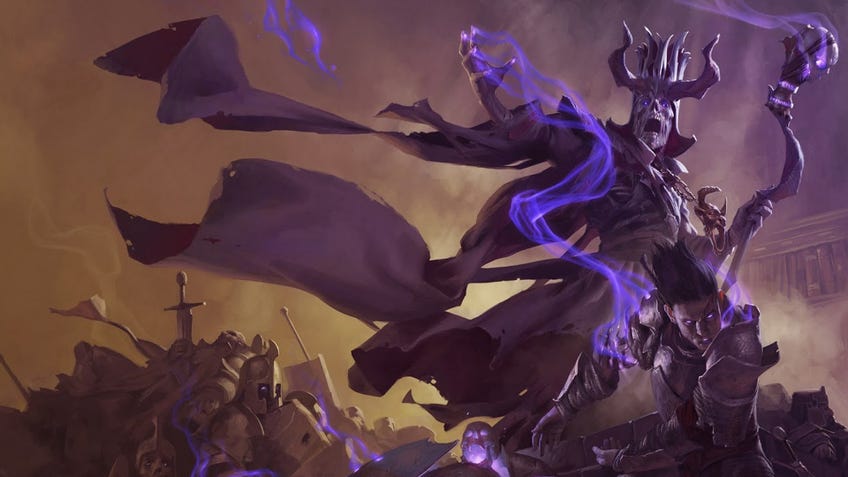D&D’s revised Dungeon Master's Guide aims at new facilitators and Critical Role fans
Chris Perkins admits current book “throws you in the deep end of the pool”.
We know the future of Dungeons & Dragons will revolve around three new editions of the core rulebooks, including a revised Dungeon Masters’ Guide. Thanks to a recent video on the popular tabletop RPG’s official YouTube channel, we now know more details about how that rules-filled tome will look.
Wizards of the Coast lead designer and eminent dungeon master Chris Perkins recently sat down with Todd Kenrick to speak more about changes to the revised DM’s Guide planned to be published as part of D&D’s 2024 update to its 5th Edition ruleset. Many of the changes will be geared towards restructuring the book so that those players intent on running sessions of D&D can learn how the game rules function before encountering their first pinch of worldbuilding or campaign construction.
The new edition will lean towards accessibility for DMs - or facilitators - of all experience levels. Perkins freely admitted that the current 5E book “kind of throws you into the deep end of the pool.” He and his writing team are aware that many of their newest players come to the hobby through actual play series - notably Critical Role. But the current DMG layout can feel labyrinthine as well as fairly divorced from the tight, exciting roleplay they watch on streams and hear in podcasts.
How will he and the core design team solve this problem? The largest solution is reorienting information so that readers encounter the basics of running the game before anything else, including common social dynamics, core rules and essential terminology.
“What’s a DM screen, and what is it used for?” Perkins asked as a hypothetical. “The DMG currently is silent on that front.”
Perkins provided a rough chapter breakdown that likely isn’t complete or final, but it does provide the most solid peek at how Wizards will structure the book meant to teach facilitators how to run their RPG for a group of players. The very basics of D&D will be followed by a ‘During Play’ section that will add group tools such as running a Session Zero from Tasha’s Cauldron of Everything.
An alphabetised rules compendium will follow and remove the need to flip back to a tiny glossary in order to find a very specific or case-sensitive rule, such as how to use firearms. Perkins said the most common feedback he receives from facilitators is “oh, I didn’t know that was in [the DMG]”. Only then will the book move into three chapters covering adventure building, campaign building and greater cosmologies. A magic item section bolstered by common inclusions from Xanathar’s Guide to Everything will follow, and after this is a “surprise”, according to Perkins.
The last mentioned chapter sparked a bit of pride in the veteran designer - appendices that include both several maps and a lore glossary. The former will include a fold-out map of “another secret”, likely whatever world the revised handbooks use as their storytelling setting. The latter will be a collection of key places, people and monsters - Waterdeep, Demogorgon and Orcus are explicitly mentioned - that newer players can reference for a quick lowdown on the “movers and shakers” in D&D’s universe.
One of the least flashy but most pivotal inclusions will be example adventures and campaigns that Perkins claimed follow a new “show don’t tell” approach in the revised DMG. These truncated but complete modules, shorter and less detailed than any published content, can be lifted from the book and used at the table. Or, they can be scrapped for parts and examined to provide a better idea of how to build your own homebrew material.
It’s heartening to see Wizards of the Coast seemingly investing considerable time into the DMG, even if most of the lessons learned and improvements made have been common considerations within indie RPGs for years. D&D is a behemoth brand and changes at the pace of historical epochs, while smaller creators can constantly iterate and keep their finger on the pulse of the player community. It’s one more reason why those expecting D&D to suddenly become a revolutionary tabletop RPG as part of the 2024 revision should lower their expectations and accept that any change is positive.










